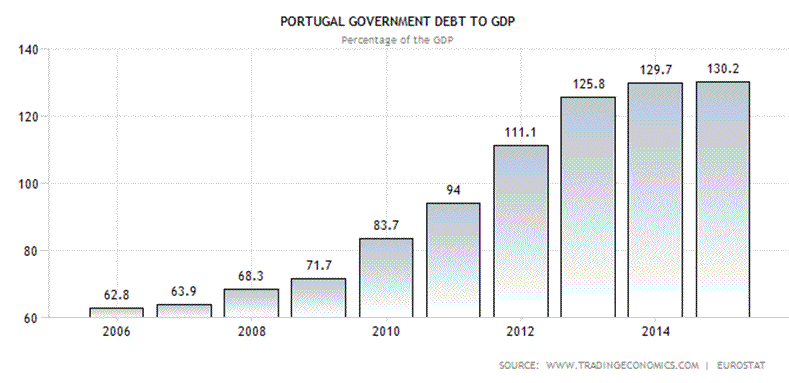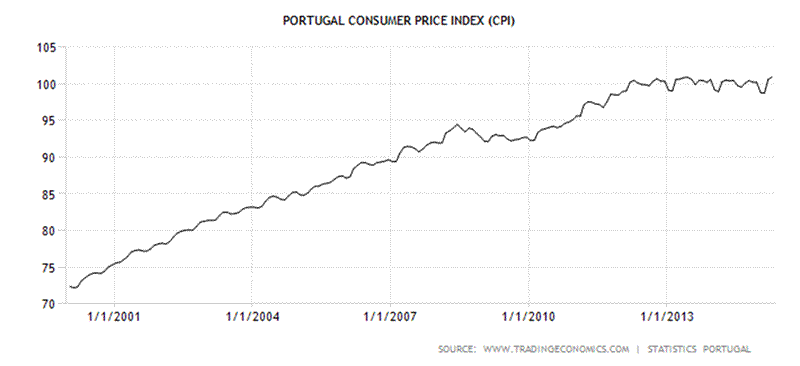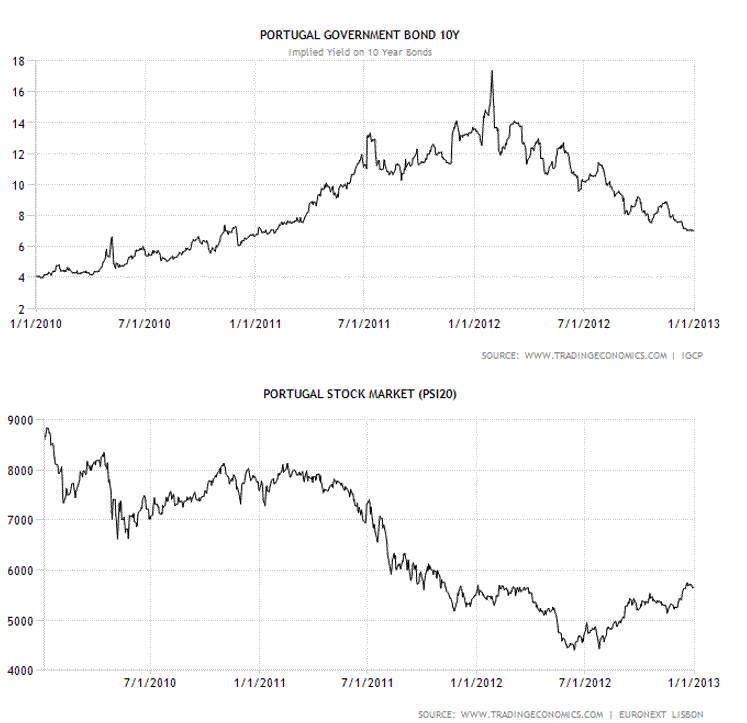Bond Bubble Bust Won’t Cause Great Rotation
Interest-Rates / Global Debt Crisis 2015 Jun 01, 2015 - 03:36 PM GMTBy: Michael_Pento
 For the first time in its country’s history, Portugal sold 6 month T-bills at a negative yield. The 300 million euros ($333 million) worth of bills due in November 2015 sold at an average yield of minus 0.002%. A negative yield means investors buying these securities will get back less money from the government than they paid when the debt matures.
For the first time in its country’s history, Portugal sold 6 month T-bills at a negative yield. The 300 million euros ($333 million) worth of bills due in November 2015 sold at an average yield of minus 0.002%. A negative yield means investors buying these securities will get back less money from the government than they paid when the debt matures.
To put this in perspective, the 10 year note in Portugal now yields just 2.38%, down from 18% a mere three years ago. Back in 2012, creditors grew wary of the countries referred to as PIIG’s (Portugal, Ireland, Italy and Greece) and their ability to pay back the massive amounts of outstanding debt. Consequently, creditors drove interest rates dramatically higher to reflect the added risk of potential defaults.
If a person had fallen into a deep slumber in the midst of the 2012 Eurozone debt crisis and awoke a week ago, they may make some reasonable assumptions as to why there was a collapse of Portuguese bond yields on the long end of the yield curve; and even displayed negative yields on the short end.
Perhaps Portugal had finally balanced their budget? Or even is now enjoying a budget surplus? To the contrary, that is not even close to the truth. Portugal has not balanced its budget…its budget deficit now sits at over 3% of GDP.
Or perhaps there was a massive restructuring of outstanding debt? Upon joining the Euro, Portuguese national debt was below the 60% limit set by the Maastricht Treaty criteria. By the start of the debt crisis in 2009, that level of public sector debt had edged up to 70% of GDP. However, the recession of 2009-12, saw a rapid increase in the level of debt. Despite recent efforts to reduce public spending and austerity measures pursued by the government, Portugal still has an immense and growing debt load, with a current National Debt to GDP ratio of over 130%.

Well then maybe there must be a dramatic deflationary cycle pushing those paltry nominal yields much higher in real terms?
Wrong again! Portugal posted a positive CPI of 0.4% year over year in April of 2015.

The truth is, the ECB would prefer bond vigilantes continue in that deep slumber, while they use artificial intervention to “do whatever it takes” to eviscerate markets and make sure sovereign debt yields never rise.
But eventually investors will wake up to the huge bubble in the bond market that must pop either through inflation, or insolvency. And when yields normalize, it will lead both the stock market and the economy into a depression.
However, the Charlatans in government and financial markets want you to believe the inevitable rising of yields in Portugal (and in the rest of Europe, the United States and Japan for that matter) will be a good economic sign. These manipulators of currencies and destroyers of savings want investors to believe they are privy to some ethereal information that only they are able to decipher. But if that were true, why then have the economic forecasts from central bankers been so incredibly inaccurate throughout history.
Likewise, central bankers also want you to believe that a rise in yields will prompt a great rotation out of bonds and into stocks--catapulting the stock markets to new highs. But higher rates in 2006 did not forebode an economic paradise, and it did not propel a 2008 great rotation out of Mortgage Backed Securities and Collateralized Debt Obligations into stocks. After all, did investors in 2008 run from collapsing real estate and mortgage related bonds into stocks when they became toxic…were they forced to put that money to work into equities right away?
Everyone who lived through the 2008 financial crisis knows that when the air came out of the mortgage bubble there was a lot of collateral damage. And in 2012 when the Portuguese bond market collapsed, investors weren’t immediately scrambling out of bonds in favor of stocks--they were aggressively shunning both during that 2010-2012 timeframe. The Ten-year Note went from 5%-18%, while the stock market was busy losing half of its value.

Central Banks around the globe have cranked up their bubble machines and are pointing them directly at the bond market. The Portuguese Central Bank has managed to engineer negative yields even though the nation has a positive rate of inflation and has become basically insolvent. In fact, the international bond bubble is vastly more pervasive and baneful than the NASDAQ and Real Estate bubbles combined. Therefore, when the bubble in bonds finally bursts, at least for a while, there will be very few places to hide outside of cash and owning hedges to plummeting equity and bond prices. And hopefully then we will all, with the perfect clarity of hindsight, acknowledge that allowing a small unelected cartel of market manipulators the power to distort markets to such a degree was a completely stupid idea.
Michael Pento is the President and Founder of Pento Portfolio Strategies and Author of the book “The Coming Bond Market Collapse.”
Respectfully,
Michael Pento
President
Pento Portfolio Strategies
www.pentoport.com
mpento@pentoport.com
(O) 732-203-1333
(M) 732- 213-1295
Michael Pento is the President and Founder of Pento Portfolio Strategies (PPS). PPS is a Registered Investment Advisory Firm that provides money management services and research for individual and institutional clients.
Michael is a well-established specialist in markets and economics and a regular guest on CNBC, CNN, Bloomberg, FOX Business News and other international media outlets. His market analysis can also be read in most major financial publications, including the Wall Street Journal. He also acts as a Financial Columnist for Forbes, Contributor to thestreet.com and is a blogger at the Huffington Post.Prior to starting PPS, Michael served as a senior economist and vice president of the managed products division of Euro Pacific Capital. There, he also led an external sales division that marketed their managed products to outside broker-dealers and registered investment advisors.
Additionally, Michael has worked at an investment advisory firm where he helped create ETFs and UITs that were sold throughout Wall Street. Earlier in his career he spent two years on the floor of the New York Stock Exchange. He has carried series 7, 63, 65, 55 and Life and Health Insurance Licenses. Michael Pento graduated from Rowan University in 1991.
© 2015 Copyright Michael Pento - All Rights Reserved
Disclaimer: The above is a matter of opinion provided for general information purposes only and is not intended as investment advice. Information and analysis above are derived from sources and utilising methods believed to be reliable, but we cannot accept responsibility for any losses you may incur as a result of this analysis. Individuals should consult with their personal financial advisors.
Michael Pento Archive |
© 2005-2022 http://www.MarketOracle.co.uk - The Market Oracle is a FREE Daily Financial Markets Analysis & Forecasting online publication.



